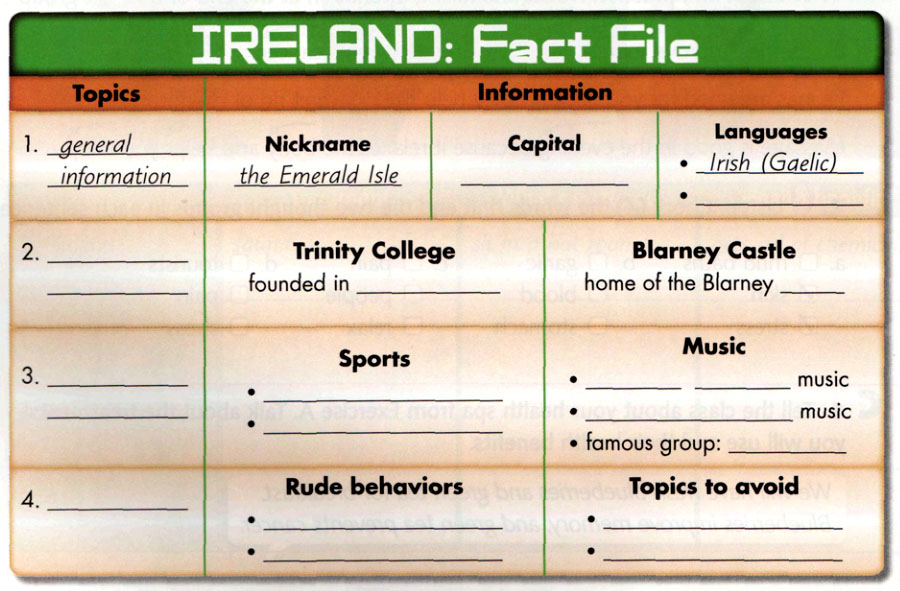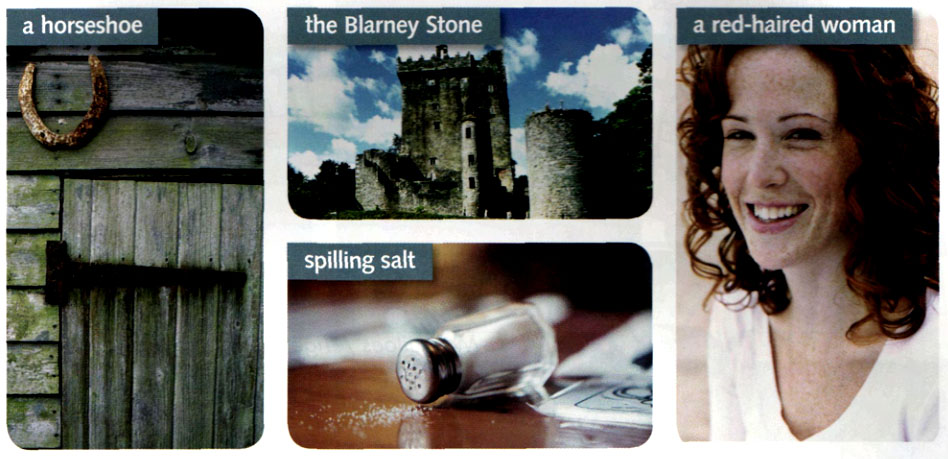Listening task 1: Information
A Listen. People are talking about Ireland. What are they talking about? Write the topics in the chart below.

Answer & Audioscripts
1 general information
2 famous sights
3 ways to relax
4 manners
Audioscripts in B below
B Listen again. Complete the missing information in the chart.
Answer & Audioscripts
|
Nickname the Emerald Isle |
Capital Dublin |
Languages Irish (Gaelic) English |
|
Trinity College founded in 1592 |
Blarney Castle home of the Blarney Stone |
|
|
Sports Gaelic football soccer |
Music Irish folk music rock music famous group: U2 |
|
|
Rude behariors cutting in line wearing a hat at the dinner table |
Topics to avoid religion politics |
|
Audioscripts
1
Woman: I’m going to talk about general information about Ireland. Have you ever heard of the Emerald Isle? That’s the nickname for Ireland because of its lush, bright green landscapes. Ireland is the second largest island in Europe and is located off the western coast of Europe. Dublin, the capital city, has a population of around one million people Ireland has two official languages. The native language, Irish or Gaelic, is spoken mainly in the areas along the western coast, but English is spoken in most parts of the country.
2
Man: More than six million tourists visit Ireland each year, and there’s plenty for visitors to see and do there. The next topic is famous sights in Ireland. If you’re visiting the capital, Dublin, you should be sure to visit Trinity College. This college, founded in fifteen ninety-two, is Ireland’s oldest university and is a very popular destination for tourists. In the south of Ireland, in County Cork, you’ll find perhaps one of the country’s best known landmarks: Blarney Castle, home of the famous Blarney Stone.
3
Woman: What do Irish people do for fun? Let’s talk about ways to relax in Ireland. There are a number of popular pastimes in Irish culture. Sports is one example. People still enjoy traditional Irish sports such as Gaelic football, and soccer is also a very popular sport in Ireland. Another popular pastime there is music. Irish folk music is very popular, but Ireland is known for rock music, too. The country’s most famous rock group, U2, started in nineteen seventy-eight, still plays sold-out concerts around the world.
4
Man: The Irish tend to be polite and courteous and will go out of their way to welcome visitors to their country. The last topic is manners. When in Ireland, as in any country, visitors should keep in mind that respecting cultural rules and manners is a good idea. Behaviors that could be considered rude include cutting in line, as well as wearing a hat at the dinner table. Also, when you speak with someone for the first time, it is best to avoid the topics of religion and politics. Try talking about sports, music, or the weather instead.
Listening task 2: Superstitions
A Listen. A student is talking about superstitions. Are the superstitions lucky or unlucky? Check (✓) the correct answers. Then write the words that gave you the hints.

|
|
lucky |
unlucky |
|
|
1 hanging a horseshoe |
◻ |
◻ |
will bring health, happiness good symbol |
|
2 kissing the Blarney Stone |
◻ |
◻ |
________________ ________________ |
|
3 spilling salt |
◻ |
◻ |
________________ ________________ |
|
4 seeing a red-haired woman before fishing |
◻ |
◻ |
________________ ________________ |
Answer & Audioscripts
1 lucky: will bring health, happiness; good symbol
2 lucky: amazing, special power, very good
3 unlucky: not good, might get sick, something bad might happen
4 unlucky: bad sign, too dangerous
Audioscripts in B below
B Listen again. What do people believe about the superstitions? Complete the sentences with the missing information.
1 If you hang a horseshoe upside down, __the luck will run out____.
2 Kissing the stone __________________.
3 If you spill salt, _________________.
4 If a fisherman saw a red-haired woman, he _________________.
Answer & Audioscripts
1 If you hang a horseshoe upside down, the luck will run out.
2 Kissing the stone will make you speak very well.
3 If you spill salt, you should throw some behind you.
4 If a fisherman saw a red-haired woman, he wouldn’t go fishing that day.
Audioscripts
1
Interviewer: Hi, Neil. Thanks for coming to speak with me about Irish culture, especially superstitions.
Neil: Sure.
Interviewer: I’ve heard about “the luck of the Irish,” and I know there are some symbols from Irish culture that people believe are lucky or unlucky. Can you give an example?
Neil: It’s interesting. I don’t really know why people say the Irish are lucky. Historically, I don’t think Ireland has been very lucky. But we do have our superstitions. For example, horseshoes are a superstitious symbol for some Irish people. That’s the U-shaped piece of metal that horses wear on the bottom of their hooves. Some people believe that if you hang a horseshoe above your door, it will bring health and happiness.
Interviewer: Health and happiness – so it’s a good symbol.
Neil: Right. It brings good luck, as long as you hang it the right way – so it looks like the letter U. But you have to be careful. A horseshoe is only lucky if you hang it right-side up. If you hang a horseshoe upside down, people believe the luck will run out.
2
Interviewer: Can you give me another example of an Irish superstition?
Neil: Well, probably the most famous one is the Blarney Stone of Blarney Castle. It’s a stone set high in a tower at a castle in the southwest of Ireland. Lots of people go there – Irish as well as foreign visitors – to climb the tower and kiss the stone.
Interviewer: They actually kiss it?
Neil: Yes. The stone is said to have an amazing, special power. Kissing it is supposed to be very good. People believe that kissing the stone will make you speak very well. It will make you a powerful, expressive speaker.
Interviewer: Hey! Sounds like a place I should visit.
3
Interviewer: So, are you superstitious?
Neil: Yes, I am, about certain things, like spilling salt, for example. I think other countries have that superstition, too. Spilling salt on the table while you’re eating is not good. You might per sick, or something bad might happen. But you can avoid the bad luck.
Interviewer: How?
Neil: Well, if you spill salt, you should throw some behind you. If you throw a little salt over your shoulder, you won’t have bad luck.
Interviewer: Interesting. I’ll have to remember that.
4
Interviewer: Are there any other superstitions you’d like to share?
Neil: One more? OK, sure. I grew up in a city in the southeast called Waterford. It’s on the coast, so there’s a lot of fishing there. I think fishermen, especially in the past, had a lot of superstitions – for example, seeing a red-haired woman before going fishing.
Interviewer: What happened if a fisherman saw a red-haired woman?
Neil: Well, the fishermen believed it was a bad sign. It meant it was too dangerous to go out to sea. If a fisherman saw a red-haired woman, he wouldn’t go fishing that day.
Interviewer: Wow! They really took it seriously.
Neil: Yes, they did.
Interviewer: Well, Neil, thank you so much. I’ve learned a lot of interesting things about Ireland and Irish superstitions.
Neil: Thank you. And good luck!
Related Posts
- Practice Listening English Exercises for B2 – The Philippines
- Practice Listening English Exercises for B2 – Unsolved mysteries
- Practice Listening English Exercises for B2 – Good business
- Practice Listening English Exercises for B2 – Values
- Practice Listening English Exercises for B2 – Personality traits
- Practice Listening English Exercises for B2 – Brazil
